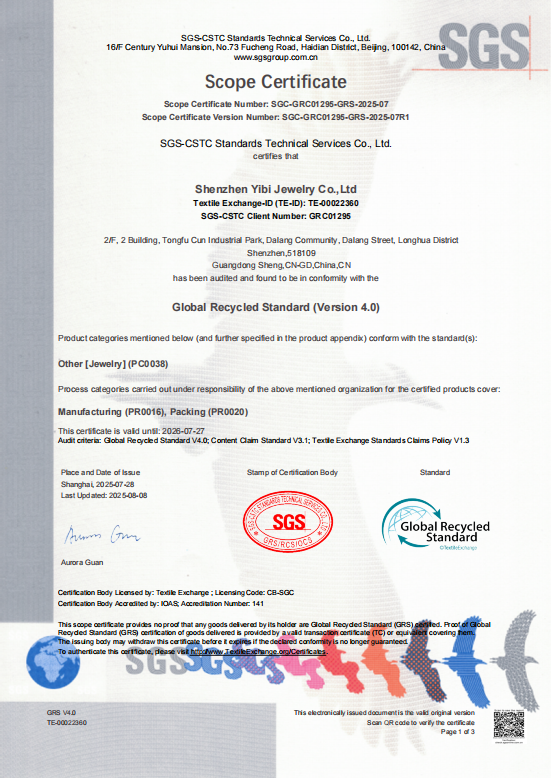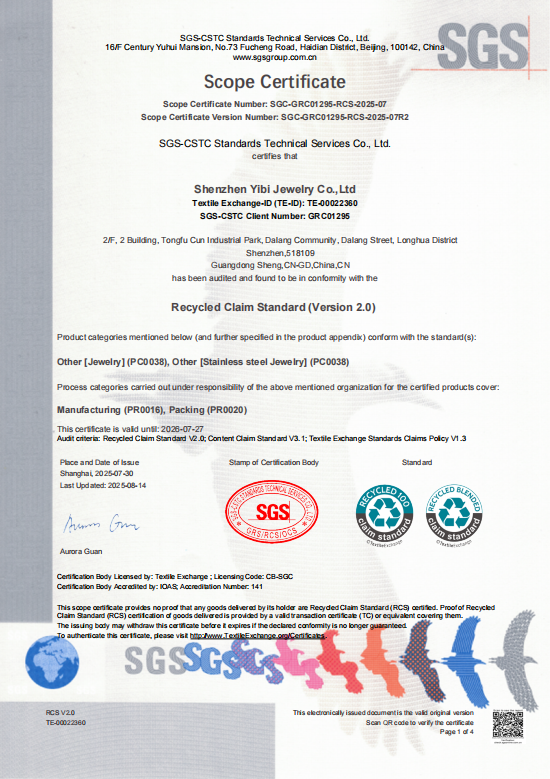YIBI Group, an established name in luxury hardware and precision metal components, is positioning itself as China Top Custom Stainless Steel Bag Hardware Manufacturer by integrating rigorous sustainability credentials such as GRS certification and RCS certification into its product offerings. Leveraging deep expertise in stainless steel and zirconia ceramic materials, as well as advanced PVD and plating techniques, YIBI is delivering high-end hardware solutions—especially custom stainless steel bag frames, buckles, clasps, and connectors—with both aesthetic excellence and environmental accountability.
In an era when consumers and brands alike demand not only craftsmanship but credibility in sustainable sourcing, YIBI’s dual focus on technical innovation and chain-of-custody discipline under GRS (Global Recycled Standard) sets it apart. Its stainless steel leather hardware is built for durability, corrosion resistance, non-oxidation, and long-term aesthetic stability, making it ideal for high-end handbags, belts, and wearable accessories.


The luxury goods sector is undergoing a transformation: leading brands are seeking to embed verified sustainability credentials into every component, not just the fabrics or packaging. Both GRS(Global Recycled Standard) and RCS(Recycled Claim Standard) are such certifications that verify the use of recycled material and enforces a transparent chain of custody from source to final product.
Where many manufacturers claim “eco-friendly” status in marketing, true certified compliance requires rigorous audit, traceability, and ongoing verification — steps that only a few hardware makers are capable of achieving. As fashion houses push sustainability goals deeper into their supply chains, hardware suppliers with robust certifications like GRS will become strategic gatekeepers to brand alignment.
1.Rising expectations for functional elegance. As the frame bag and structured handbags regain visibility, the demand for customized metal hardware — from hinges to locking mechanisms — is rising. Brands no longer accept generic hardware; each piece is now part of the product’s visual signature.
2.Material sophistication. Stainless steel, zirconia ceramic, and advanced PVD finishes are becoming preferred choices because of their superior corrosion resistance, color stability, and scratch durability. YIBI itself promotes stainless steel’s environmental properties — resistance to fading, oxidation, and long life cycles.
3.OEM/ODM relationships, not commodity supply. Brands increasingly demand hardware partners who can do more than “parts.” They want technical collaborators able to convert boutique sketches into mass-manufacturable metal components, integrate surface technologies, and manage quality across scales.
4.Precision meets scale. For frame-based bags and hardware-centric accessories, margin for dimensional deviation is near zero. A hinge must align to microns; a clasp must operate quietly and smoothly across thousands of cycles. Suppliers that can consistently deliver tight tolerances under full production are rewarded.
Given these forces, YIBI’s strategy — blending technical excellence with sustainability credentials — is well-timed. Many brands are now filtering suppliers not only on cost and lead time, but on how well they align with ESG goals.
Founded with roots in hardware and metal processing, YIBI is headquartered in Shenzhen and has built a reputation as a hardware & jewelry OEM/ODM specialist. Its product portfolio emphasizes stainless steel and zirconia ceramic hardware, using advanced techniques such as metal injection molding (MIM) and ceramic injection molding (CIM). YIBI holds certifications including ISO9001, TS/16949, RCS, and now is advancing its commitment with GRS certification.
By formalizing the GRS certification, YIBI enables downstream brands to credibly claim recycled content even in their metal hardware components — a rare assurance in a category where metal itself is typically assumed “virgin.” This certification underscores YIBI’s ambition to lead not only in performance but in sustainability compliance.
Client Cases & Market Presence
Though specific brand names are often under NDA, YIBI has a strong track record supplying international luxury and designer labels. They have been multiple times recognized in industry directories as a reliable high-quality hardware vendor.
We have more than 15 years of experience in luxury hardware and precision metal parts, positioning them as a global OEM partner. YIBI is often listed as a trusted vendor in directories for jewelry, bag hardware, and precision MIM hardware.
Through its sustainability credentials and technical depth, YIBI is reinforcing its role as more than a supplier — increasingly it acts as a strategic hardware partner to brands seeking traceable, high-performance, and design-faithful components.
YIBI’s decision to publicize its GRS certification is more than a marketing milestone — it signals a deliberate strategic pivot. In an ecosystem where brands must show credible sustainability along with premium experience, hardware suppliers will no longer be peripheral. YIBI seeks to be the go-to hardware partner for brands that prioritize both functional excellence and environmental accountability.
In the coming years, as recycled material traceability becomes more central to consumer trust, YIBI’s layered investment — combining stainless steel excellence, jewelry-grade finishing, and certified chain-of-custody discipline — is likely to make it a benchmark in the industry.
For brands, designers, and stakeholders seeking a hardware collaborator that grasps both the art and responsibility of premium accessories, YIBI offers a rare alignment of skills, ethics, and execution. Its infrastructure, certification, and track record make it a compelling candidate in global supply chains.
For more information, visit YIBI’s LinkedIn profile:
https://www.linkedin.com/company/yibi-group/